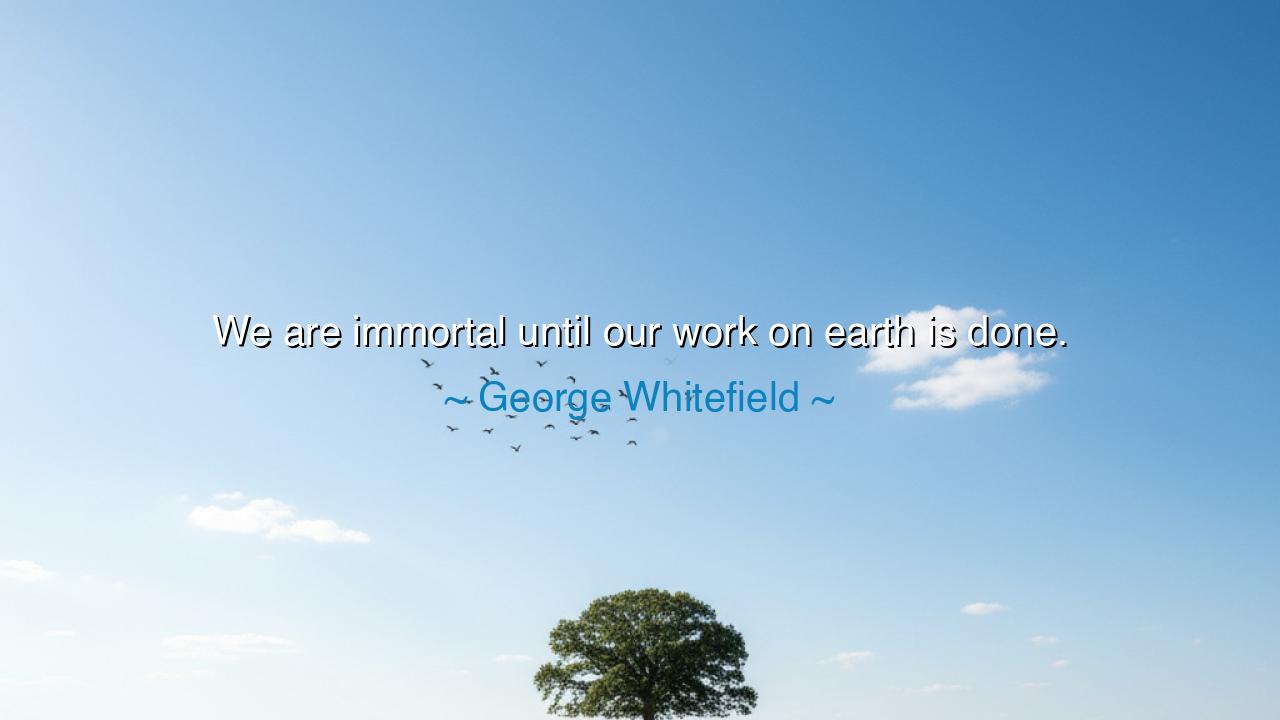
We are immortal until our work on earth is done.






The fiery preacher George Whitefield once declared with unshakable faith: “We are immortal until our work on earth is done.” In these words he gives voice to the conviction that human life is not governed by chance nor by fear, but by divine purpose. Each soul is sent into the world with a sacred work, and until that work is completed, death itself cannot touch them.
For true immortality does not mean the body cannot perish, but that the soul is guarded by Providence until its appointed mission is fulfilled. Whitefield, who crossed seas and thundered sermons to thousands, knew well the dangers of illness, travel, and opposition. Yet he feared not, for he believed that no blade, no storm, no sickness could claim him before the appointed hour. Such faith gave him courage to labor without rest, knowing he was held in the hand of God.
This saying teaches that life is not an accident but a calling. To be alive is to be entrusted with a task—whether great or small—that only we can perform. Until that purpose is achieved, we walk as immortals, shielded not by armor but by destiny. And when the task is complete, then death is not defeat but release, the moment when one is called home, having fulfilled what was required.
The ancients, too, believed in such providence. Warriors marched into battle convinced that fate would not take them before their time. Prophets spoke boldly before kings, trusting that the divine had not yet finished with them. Whitefield’s words echo this same heroic confidence: that fear of death must never silence duty, for the span of one’s life is measured not by years but by the completion of work.
So let this wisdom endure: live not in fear of the grave, but in devotion to your work. Until it is done, you are immortal; and when it is finished, you will have left a legacy that even death cannot erase. For the true measure of man is not how long he lives, but how faithfully he fulfills the purpose for which he was sent.






MTDo Hoang Minh Thien
George Whitefield’s words speak to the idea that life is a journey with a higher purpose guiding us. The notion of immortality until our work is done is comforting, but also raises the question: What if our purpose evolves over time? Does the completion of one task lead us to another, or is there a final, ultimate ‘work’ that we are meant to accomplish? How do we know when we’ve reached that point?
PVNguyen Hoang Phuong Vu
This quote really makes me think about mortality and purpose. The idea that we are immortal until our work is done suggests that we have divine protection or a higher calling. But how do we reconcile this with the fact that not everyone has a clear sense of purpose? Can we still find fulfillment and meaning if our ‘work’ seems unclear or undefined, and does that mean our time on earth isn’t yet over?
NPNgoc Phung
I find George Whitefield’s quote both comforting and thought-provoking. The idea of being immortal until our work is done gives a sense of being invincible as long as we’re fulfilling our purpose. But what about those who feel like they haven’t figured out their ‘work’? Is the concept of ‘work on earth’ just about big, grand tasks, or does it include the small, everyday actions that impact those around us?
VHNguyen Van Hiep
George Whitefield’s perspective resonates with me on a deep level. It reminds me that our lives are meaningful, and we are not just here by chance. There’s a sense of protection and guidance in his words, but it also makes me wonder: how do we recognize when our ‘work’ is done? Does everyone have a clear sense of their purpose, or is it something that we only understand after reflecting on our lives?
HMHoang Ha Minh
This quote by George Whitefield makes me reflect on the idea of purpose and destiny. The thought that we are immortal until our work is done gives a sense of security and purpose in life. It suggests that there’s a reason we’re here, and as long as that purpose is being fulfilled, we’re protected. But what happens if we don’t know what our purpose is? How do we find our ‘work’ and ensure we’re fulfilling it?